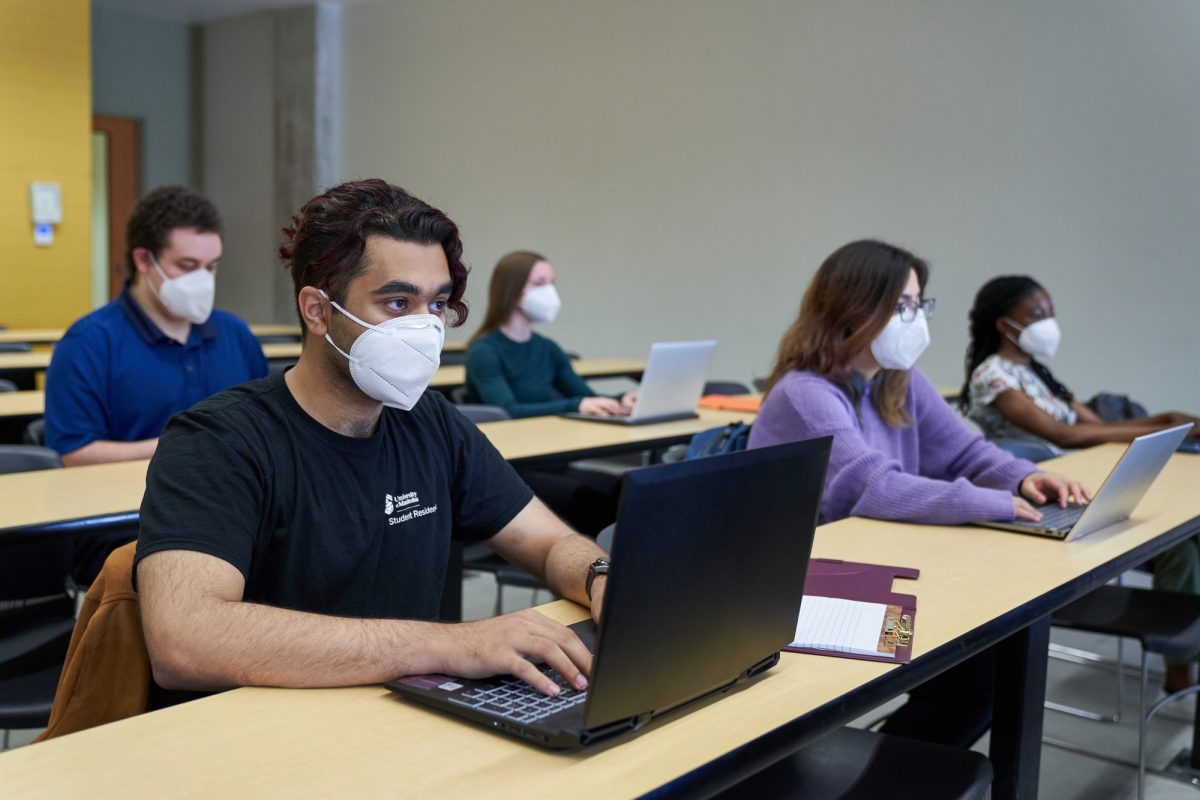
Follow your passion and start small
How UM instructors are finding new ways to integrate experiential learning approaches into their courses
In the fall of 2021, Stephanie Chesser, assistant professor in the faculty of Kinesiology and Recreation Management, gave her students a unique assignment.
For five weeks of their Leisure and Aging course, students were each tasked with selecting an older person in their lives to interview about their weekly course topics (e.g., technology and leisure, social isolation and loneliness). The intent of the assignment was to allow students the opportunity to see how course concepts are interpreted and experienced by an older person whom they are familiar with. Students then created interview questions based on each week’s content and took notes of their interviewee’s responses.
Inspired by the loneliness and disconnection resulting from the COVID-19 pandemic, Chesser says she designed the assignment to help connect students with older generations, and challenge some of her students’ pre-held beliefs about aging.
“It’s really sort of centered on this idea that I can lecture in class about aging related theories and experiences and students can read about it in their textbooks and their readings – but does it hold water in the real world with an actual older person? What are their experiences with it? How do their experiences compare or contrast with what we’re talking about?”
Chesser says that while students were a bit intimidated by the assignment at first, it wasn’t long before they were not only invested in their assignment, but their interviewees were also.
“I think for a lot of them having that discussion was meaningful for them and helped to reframe some things. Intergenerational learning can be a great opportunity to reduce ageism and to just dispel some of those negative stereotypes.”
Once the interviews had been completed, students compiled their notes and wrote papers comparing what they’d discussed in class with what their interviewee expressed, reflecting on what they had learned.
“I think some of them had this very negative view of aging being about loss of all the things that they wouldn’t be able to do,” says Chesser. “I think for many of them, they got to see that older people can live very active involved lives.”
This assignment is one of many examples of the transformative power of project-based experiential learning at UM, where students learn by doing and then reflect on their experience to make meaning from what they just learned. This experiential approach integrates principles drawn from Indigenous pedagogies, including respect, reciprocity, and reflection, and is inextricably linked to Indigenous ways of knowing, being, and doing.
Rebecca Brooks is one of the faculty specialists in Experiential Learning at the Centre for the Advancement of Teaching and Learning’s Office of Experiential Learning. Over the coming months, their office will be facilitating a variety of collaborative workshops for instructors who are interested in learning more about how to integrate experiential learning concepts into their courses, sharing their ideas, and collaborating with other faculty members.
“There are a lot of opportunities for people to either collaborate or just learn from things that are already working. Individuals might be in different faculties or have not had a chance to cross paths yet, so this is a bit of a way of facilitating a conversation with people who can come together and share from their own experiences.”
What exactly is Experiential Learning?
At the University of Manitoba, EL occurs within the curriculum and in co-curricular settings. Institutionally recognized EL must meet six specific criteria. Of the six criteria outlining experiential learning, Brooks says that most important components for instructors is to be intentional in creating an experience that is meaningful and relevant to students, while giving the time and space for students to engage in critical reflection.
“It’s important for instructors to really think about experiential learning in an intentional way. You want a direct experience that’s meaningful and relevant for students in terms of the learning outcomes of the course,” says Brooks. “Taking the time for students to engage in critical reflection closes the loop, because it’s where students generate their own meaning for that experience, make decisions potentially about their future, and form new knowledge based on the experience.”
Experiential learning is categorized into 12 types, each intentionally designed to address specific student outcomes in co-curricular settings and/or situated within a workplace. They provide opportunities for students to respond directly to the TRC’s Calls to Action and reflect UM’s commitment to the education of the whole student, the diversity of learning experiences at UM, and the dynamic, seamless nature of the experiential learning landscape. Learn more about the 12 types here.
Brooks says the best approach for instructors who are looking to integrate more project-based experiential learning into their courses is to start small, pick something you are passionate about, and be intentional about creating experiences that are inclusive and respectful to the diverse needs and worldviews of students.
“Pick an activity that you think would be relevant, pick an experience that you think will really be an ‘aha!’ moment for students and find a way to embed it in your course and test it out,” advises Brooks.
“Recognize that there’s going to be unanticipated challenges, but they’ll also be good opportunities for you to learn, to get feedback from your students and then to make the experience stronger. Start small, try one thing, test it out. Reflect on it and figure out how to do it better next time.”






